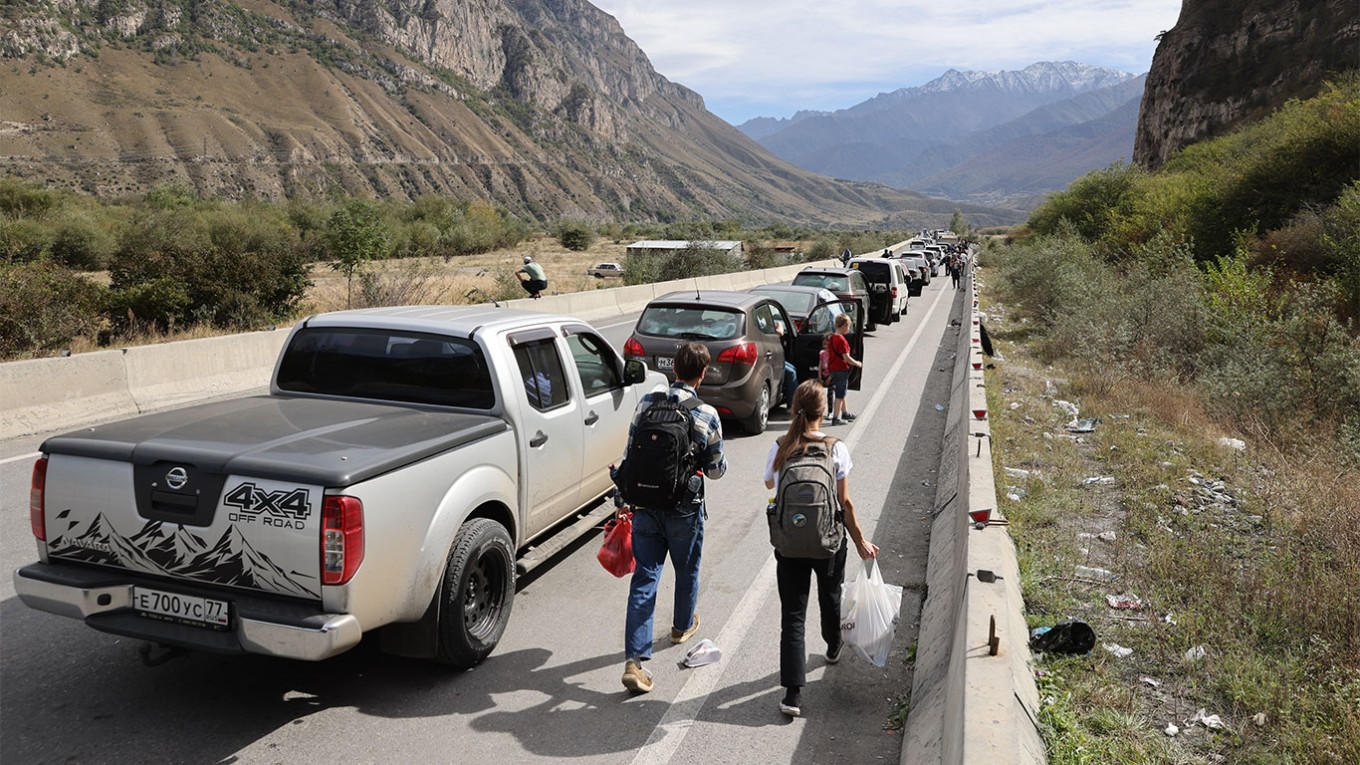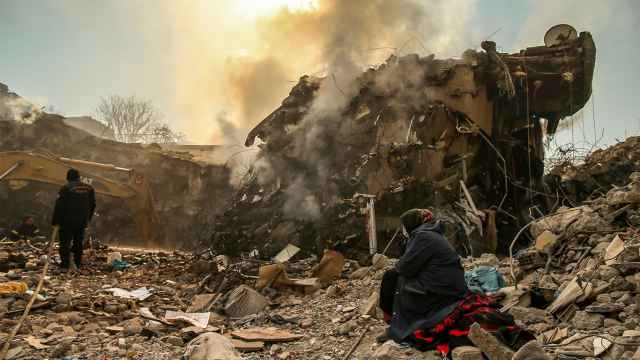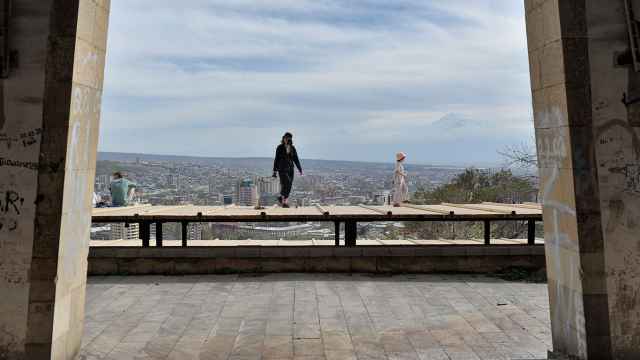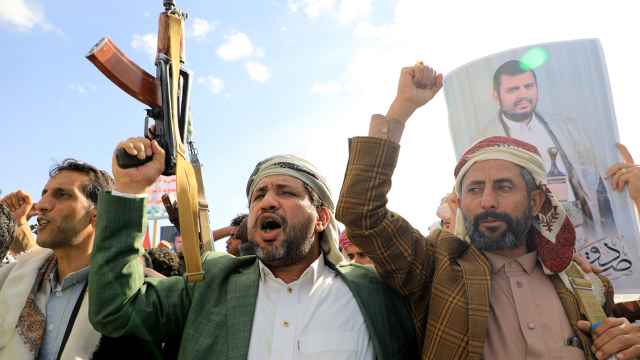The European Union parliament adopted a resolution last week that, among other things, highlighted how members of Russian civil society and opposition groups living in exile in Europe struggle to live under the bloc’s sanctions policy. Instead of helping bring an end to the war, this state of affairs could “instead harm the credibility of the EU.” This is an accurate assessment of the situation.
The Kremlin’s full-scale invasion of Ukraine sparked various forms of protest across Russia. One of the most visible was voting with one’s feet. As of Sept. 28, 2023, an estimated 820,000 to 920,000 have left the country — in fear of persecution, economic hardship or mobilization, or simply for the sake of moral clarity.
Some exiles were welcomed with open arms. In Kazakhstan and Armenia, locals organized housing and collected food for the new arrivals. But in many cases, these exiles became a favorite scapegoat of local politicians due to a mix of societal grievances, historical legacies and international pressure.
Russia’s border with the EU is effectively closed as Finland and the Baltic countries have imposed a harsh entry ban on Russians. The ban is so severe that even Ukrainians who were deemed to have spent “too much time” in Russia, and Israelis with Russian backgrounds, risk being turned back. Reportedly, even a genuine asylum seeker, who tried to request asylum after exiting a train from Moscow to Kaliningrad, was turned over to the Russian authorities by Lithuanian border guards.
A few other EU countries, such as Belgium and the Czech Republic, have also stopped issuing tourist visas for Russians, citing security concerns. Exiles are similarly shunned in Georgia, where Western-leaning President Salome Zourabichvili recently said it was “unnerving” that Russian emigres “believe that they are at home” in Georgia. Central Asia’s Kazakhstan and Kyrgyzstan, while still extremely lenient on migration, recently tightened their rules after an influx of Russian exiles.
So what motivates this hostile response to people fleeing their government because they are unwilling to kill or be killed, or be persecuted for their political opinions? The answer is complex. But, regional nuances aside, there are three main drivers.
For many of Russia’s neighbors, the reason lies in the legacy of imperialism of the Russian Empire and the Soviet Union. With the Kremlin’s invasion of Ukraine, it is no wonder that locals might view the new arrivals with suspicion. These Russian exiles are often seen as an extension of the Kremlin, even though they are fleeing Putin’s repression.
The second reason could be the threat the exiles pose to the social fabric of poorer nations. An influx of Russians needing a place to live caused rents in cities like Yerevan and Tbilisi to skyrocket. At the same time, global inflation went up, putting a massive strain on the consumer economy.
Lastly, there is international pressure. EU foreign policy chief Josep Borrell warned Georgia that its accession to the bloc could be jeopardized by Tbilisi’s resumption of direct flights to Russia.
Regardless of the true underlying causes, pundits and politicians in the West, and countries that are trying to take a westward path, like to portray the tightening of immigration rules against Russians as a way to fight Moscow. This line of thinking dehumanizes Russians. As put by former president of Estonia Toomas Ilves, they are believed to possess an “ethnic solidarity for genocide.” The argument is quite simple: hurting Russians means hurting the Kremlin.
In reality, nothing could be further from the truth. Tightening immigration rules helps the Kremlin immensely. Thus anyone who is making exiles’ lives harder is making Putin’s life easier, whether that was their intention or not.
The most immediate impact of tightening immigration rules is that it will be harder for anti-war activists to escape the Kremlin’s wrath. For many activists, staying in Russia could mean imprisonment and torture, potentially putting their lives at risk. Leaving aside the purely moral consideration of believing Russians opposed to the war deserve to live decent lives, there are more pragmatic reasons for making their departure easier.
Operating from abroad has become the norm for Russian anti-war projects. This is not to disregard the courageous work of civil society groups who remained in Russia. But some things — like publishing freely — are only possible in exile, as independent journalists know all too well. Rejecting Russian exiles makes it harder for the Russian opposition to continue resisting the Kremlin.
There are also some who have no empathy for Russians and argue they need to be kept in Russia, expecting that they could overwhelm the Kremlin and force a regime change. But unlike fictional characters, Russian activists have enough self-preservation and concern for their families to refrain from launching suicidal attacks against a nuclear-armed authoritarian state, which possesses one of the largest repressive apparatuses on the planet.
The Kremlin has carried out at least 19,747 detentions of anti-war protesters, often brutally, utilizing a police force that is twice the size of America’s. The security forces also employ state-of-the-art surveillance, allowing them to track and detain activists everywhere.
Some contrast the plight of exiled Russians with that of war refugees in Ukraine, Syria, and Gaza, arguing Russians have not suffered enough for the West to take pity on them. But in reality, the Kremlin’s domestic repression is also a serious reason to flee.
It should not be impossible to grasp both that Ukrainian refugees have been through hell, and that some Russian exiles might be escaping potential imprisonment and torture in their home country. The West’s aid to Russian exiles should not come at the expense of aid to war refugees. If anything, by accepting Russian exiles, the West maintains its moral standing and damages Putin’s war effort.
Aside from disrupting the opposition’s work, anti-exile policies give ammunition to the Kremlin’s propagandists. Putin built his regime by painting Russia as a besieged fortress, constantly threatened by the West that is out to get Russians wherever they are. What could be better proof of this than exiles being turned back by the very liberal countries they wanted Russia to be like?
This, too, addresses the constant concern that fleeing Russians might not be sufficiently against the war to deserve sanctuary. But if the West wants to break the spell of Kremlin propaganda it needs to be less hostile to Russia. Then, propagandists in Moscow would have less ground to stand on when they accuse the West of plotting the wholesale destruction of the Russian people. One of the valuable lessons we should have learned from the Cold War is that cross-border connections were key to the liberalization of Soviet society. Unfortunately, Western capitals don’t appear to be heeding the past.
Some might argue that the Kremlin does not want the immigrants to return. But, if that is the case, why would Kremlin spokesman Dmitry Peskov encourage exiles to do exactly that? “Their motherland is Russia. And it is always waiting for them,” Peskov said in October.
Furthermore, why would Russia’s security services kidnap escapees? This is what happened with activist Lev Skoryakin, who was kidnapped in Kyrgyzstan and disappeared until a lawyer affiliated with our organization, OVD-Info, found him in a Moscow jail. His comrade Ruslan Abbasov was refused asylum in the EU despite having an easily provable history of protesting against the Kremlin. Furthermore, a Russian activist was just recently kidnapped from Georgia. While these cases are too few to establish a trend, they show the Kremlin’s intent.
Even the Russians who have fled for economic rather than ideological reasons are a net loss for the Kremlin. The more Russians leave, the fewer soldiers the Kremlin has to throw at Ukrainian lines, the fewer workers it has to power its military plants, and so on. Fifteen percent of escapees who fled Russia have since returned, perhaps because they did not find acceptance or economic opportunity abroad. This means that Russia’s human capital is now stronger by thousands of people.
Not aiding Russians in escaping the Kremlin is thus tantamount to maintaining Putin's war machine. Yet Western nations, such as Germany and the U.S., confirmed that draft evasion is not enough reason for automatic asylum status.
Attempts to tighten immigration rules for Russians might be based on sincere beliefs. But anti-exile policies help Putin strengthen his fortress Russia narrative, bolster his war machine and weaken the opposition. A more welcoming policy would undermine the Kremlin’s war effort. Not only would it lose manpower, but Russians would be persuaded that Moscow’s propaganda is based on a web of lies.
A Message from The Moscow Times:
Dear readers,
We are facing unprecedented challenges. Russia's Prosecutor General's Office has designated The Moscow Times as an "undesirable" organization, criminalizing our work and putting our staff at risk of prosecution. This follows our earlier unjust labeling as a "foreign agent."
These actions are direct attempts to silence independent journalism in Russia. The authorities claim our work "discredits the decisions of the Russian leadership." We see things differently: we strive to provide accurate, unbiased reporting on Russia.
We, the journalists of The Moscow Times, refuse to be silenced. But to continue our work, we need your help.
Your support, no matter how small, makes a world of difference. If you can, please support us monthly starting from just $2. It's quick to set up, and every contribution makes a significant impact.
By supporting The Moscow Times, you're defending open, independent journalism in the face of repression. Thank you for standing with us.
Remind me later.








